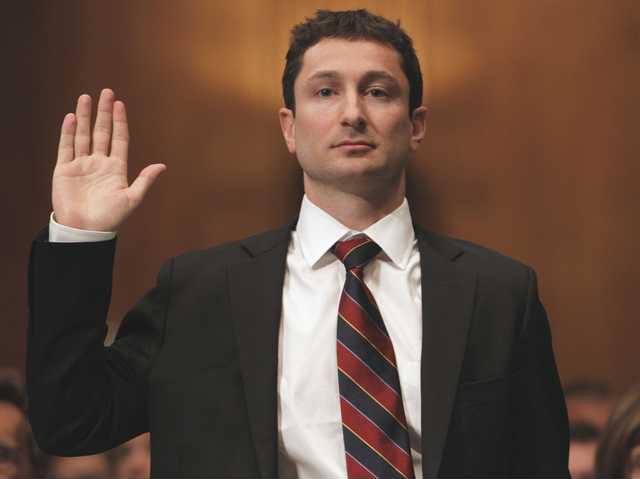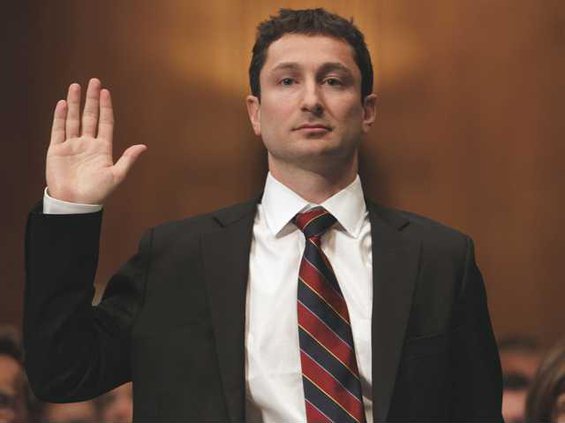WASHINGTON - Top Goldman Sachs officials defended their conduct in the financial crisis on Tuesday, flatly disputing the government's fraud allegations against the giant financial house. "I did not mislead" investors, insisted a trading executive at the heart of the government's case.
But they ran into a wall of bipartisan wrath before a Senate panel investigating Goldman's role in the financial crisis and the Securities and Exchange Commission fraud suit against it and one of its traders. Democratic Sen. Carl Levin of Michigan accused Goldman of making risky financial bets that "became the chips in a giant casino."
Fabrice Tourre, a 31-year-old trader at Goldman and the only company official directly accused in the SEC suit - testified that he does not recall telling investors that a Goldman hedge fund client had bought into an investment that soured. Instead, the hedge fund, Paulson & Co., bet against the security - and profited handsomely.
"I deny - categorically - the SEC's allegation," Tourre said. "And I will defend myself in court against this false claim."
Federal regulators said Tourre marketed an investment designed to lose value. In a brash January 2007 e-mail, one of many by him that have come to light, Tourre called himself "The fabulous Fab standing in the middle of all these complex, highly leverage exotic trades."
Tourre told the panel under questioning: "I regret the e-mails. They reflect very bad on the firm and myself. I wish I hadn't sent them."
About a half dozen protesters were in the committee room, dressed in prison stripes with names on signs around their necks of Tourre and Goldman CEO Lloyd Blankfein, who was also scheduled to testify. "Fabulous Fab is not so fab when he takes from the poor," the protesters spoke as a chorus before the hearing started. "We want to see these guys behind bars."
Ten days after the SEC action, the panel is looking into allegations that Goldman used a strategy that allowed it to profit from the housing meltdown and reap billions at the expense of clients.
Levin, the committee chairman, said actions by Goldman Sachs wreaked havoc on the economy. "Its conduct brings into question the whole system of Wall Street," Levin said.
He pressed Daniel Sparks, former head of Goldman's mortgages department, on whether the company felt it had a moral obligation to disclose to clients that it was making side bets against the same risky investments it was selling to them.
Sparks said the clients "should look at the assets themselves" that made up the mortgage-based securities they were buying. "Clients who did not want to participate in that deal did not," he said of one particular transaction.
Levin also asked Sparks about a $1 billion product called Timberwolf that Goldman sold to investors while betting against it. Levin cited an e-mail sent to Sparks from another Goldman executive using an expletive to describe Timberwolf as "one s----y deal."
"Your top priority is to sell that s----y deal," Levin said. "Come on, Mr. Sparks, should Goldman Sachs be trying to sell a s----y deal?"
"I didn't use that term," the Goldman executive responded.
Criticism of Goldman's behavior came from both sides of the aisle.
Sen. Susan Collins of Maine, the top Republican on the panel, said Goldman officials were "celebrating the collapse of the housing market when the reality for millions of Americans is loss of homes and disappearing jobs."
Sen. John McCain, R-Ariz., said that while there may not be proof that Goldman did anything illegal, a reading of e-mails from Goldman officials bragging about profiting from bets against the housing market showed "there's no doubt their behavior was unethical and the people will render a judgment as well as courts."
And Sen. Claire McCaskill, D-Mo., accused Goldman of "pure and simple raw gambling."
The hearing came as the Senate grapples with Democratic-sponsored legislation to overhaul the nation's financial regulation system and prevent another meltdown. The legislation would crack down on the kind of lightly regulated housing market investments that helped set off the crisis.
On Wall Street, Goldman's stock rose as much as $4.16 early in the hearing, but pulled back as the wider market declined. Still, it was one of the relatively few winning stocks, rising 88 cents, or 0.6 percent, to $152.91.
Edward Yardeni, an independent market analyst, said investors may have been reassured by the fact that the testimony hadn't revealed new details about the bank's dealings in risky investments.
"Despite the interrogation, the Goldman team hasn't really provided any new information," Yardeni said.
The SEC says Goldman concocted mortgage investments without telling buyers they had been put together with help from a hedge fund client, Paulson & Co., that was betting on the investments to fail. The agency also charged Tourre.
Goldman disputes the charges and says it will contest them in court.
Blankfein, in prepared testimony, repeated the company's assertion that it lost $1.2 billion in the residential mortgage meltdown in 2007 and 2008 that touched off the financial crisis and a severe recession.
He also argued that Goldman wasn't making an aggressive negative bet - or short - on the mortgage market's meltdown.
"We didn't have a massive short against the housing market, and we certainly did not bet against our clients," Blankfein said. "Rather, we believe that we managed our risk as our shareholders and our regulators would expect."
Levin asserted: "I think they're misleading the country."
The Senate panel provided excerpts of company e-mails showing a progression from late 2006 through the full-blown mortgage crisis a year later. Levin said they show Goldman shifted in early 2007 from neutral to a short position, betting that the mortgage market was likely to collapse.
"That directional change is mighty clear," Levin said. "They decided to go gangbusters selling those securities" while knowing they were sour.
"We have a big short on," Tourre wrote in a December 2006 e-mail.
Sparks wrote to other executives in March 2007, "We are trying to close everything down, but stay on the short side."

